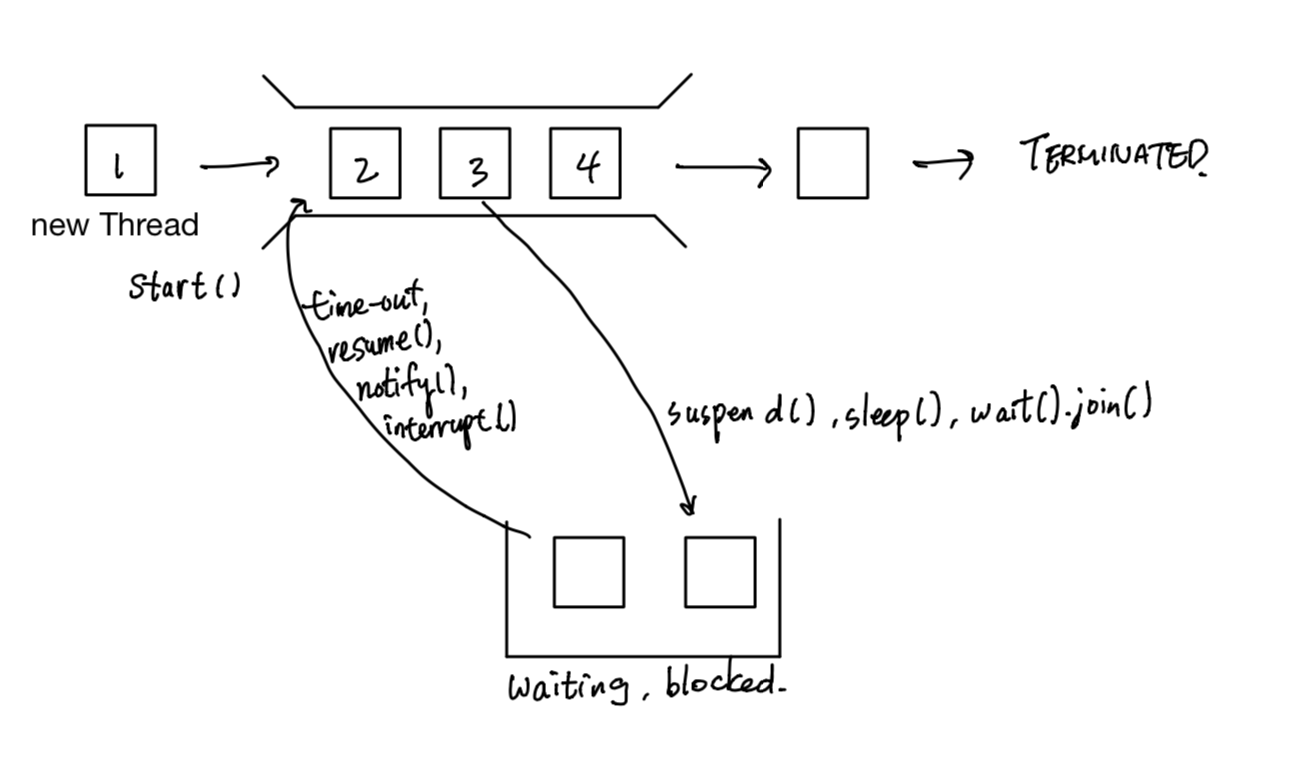Thread flow and control
Thread flow and control

- sleep(long millis) : stops a thread for a given amount of time (static method)
public class ThreadSleepMain { public static void main(String[] args) { tsleep1 t1 = new tsleep1(); tsleep2 t2 = new tsleep2(); //t1 and t2 are simple threads that prints - and |, respectively t1.start(); t2.start(); try { t1.sleep(2000); } catch (InterruptedException e) {} System.out.println("finish!"); } }Console ———||||||||||||||||||||||||||||||||||||||———-||||||||||||||||||||||||||||||||||||||||||||||————————|||||||||||—||||———-|||||||||||||||———————–|||||||||||——————————————————————————————-|||||||||||||||—————-|||||||||||||—————————————————————————-|||||||||||||—||||||||||———————————–|||||||||||||||||||||||||||||||||||t1 terminated |||||||||||||||||||||||||||||||||||||||||||||||||||||||||||||||||||||||||||||||||||||||||t2 terminated finish!
The above result is different from time to time; sometimes t2 finishes first. Note that sleep applies for the current working thread. To properly apply sleep method to t1, the code has to be inserted into t1 class directly.
- interrupt() : cancels thread’s task
public class ThreadInterrupt {
public static void main(String[] args) {
Tinterrupt t1 = new Tinterrupt();
t1.start();
String input = JOptionPane.showInputDialog("Enter any value");
System.out.println("You entered : "+input + ".");
t1.interrupt();
System.out.println("is Interrupted "+t1.isInterrupted());
}
}
public class Tinterrupt extends Thread {
@Override
public void run() {
int i = 10;
while (i!=0 && !isInterrupted()){
System.out.println(i--);
// try {
// Thread.sleep(1000);
// Thread.interrupted();
// } catch (InterruptedException e) {
// e.printStackTrace();
// }
for(long x= 0; x<2500000000L; x++);
}
System.out.println("Count finished.");
}
}
Console Output
10
9
8
7
6
5
4
You entered : 1.
is Interrupted true
Count finished.
Interesting thing happens when you put the thread to sleep(). The isInterrupted sometimes shows false() and even after inputting some value the count goes on. This is because sleep() causes InterruptedException. Adding interrupted() inside the try-catch block sets the state back to the original one.
- suspend(), resume(), stop() (Not covering)
- yield() (Not covering)
- join() : waits for other thread’s task is done.
public class ThreadJoinMain {
static long startTime = 0;
public static void main(String[] args) {
Threadj1 t1 = new Threadj1();
Threadj2 t2 = new Threadj2();
//t1 and t2 prints - and | 200 times, respectively.
t1.start();
t2.start();
startTime = System.currentTimeMillis();
// try {
// t1.join();
// t2.join();
// } catch (InterruptedException e) {
// e.printStackTrace();
// }
System.out.println("Time taken: "+ (System.currentTimeMillis()-startTime));
}
}
Console Output (commented)
Time taken: 0
-------||-------------------|||||||||||||---------||||||||||------------------------------------------------------------------------------|||||||||---||||||-------------||||||||||||-----------||||------|||||||||||||||||||||||||------||||||||----------|||||||||||||||||||||||||||||||||||||||||||||||||||||||||||||||||||||||||||||||||||||||||||||||||||||||||||||||--------------------------------------
Console Output (comment disabled)
---------------------------------------||||||||||||||-----|||||------||||||||||||||||||||||||-------|||||||||||||||||||||||--|||||||------|||||||||------------------------||||||||||||||||||||||||||||||||||||||||||||------------||||||||||||-------|||||||||||||------||||||||||||||||||||---------|||||||||||||||||||||||------||||--------------------------||---------------------------------------------
Time taken: 4
As can be noted, when join() is called from the main stack, threads t1 and t2 intervene and only after they are finished the rest of main thread is working. One more thing to note is that join() is different from sleep() in that it is not a static method; it is specific to the object calling the method.